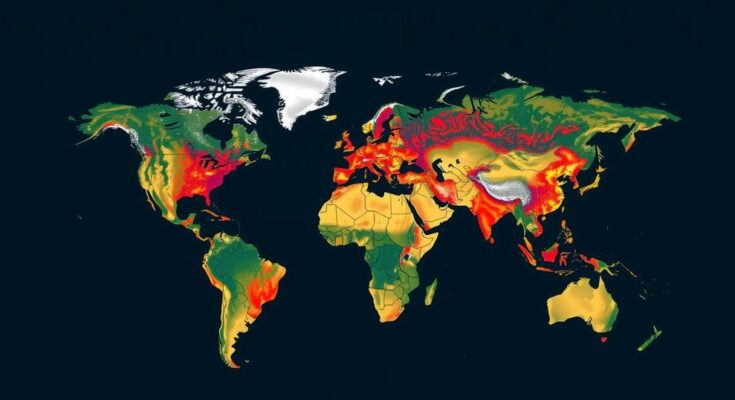A new report indicates that climate change significantly threatens global health, with record levels of health risks observed in areas such as heat-related deaths and the spread of infectious diseases. Released amidst unprecedented climate events in 2023 and before critical climate talks, the report urges immediate action to address these escalating risks. While some progress has been made in reducing pollution, experts stress that time is running out to mitigate these deepening threats to public health.
A recent report highlights the escalating risks to human health attributable to climate change, illustrating a range of unprecedented threats. Released as 2023 is projected to become the hottest year on record, this report from the Lancet Countdown on health and climate change outlines the dire implications of escalating global temperatures, including increased mortality rates among the elderly, a surge in infectious diseases, and widespread food insecurity due to extreme weather conditions such as droughts and floods. The report, which involved contributions from 122 specialists, including those from esteemed institutions such as the World Health Organization, documented that ten out of fifteen monitored health indicators have reached alarming highs. Notably, it found that deaths from heat among those aged 65 and older have surged by 167 percent since the 1990s. Furthermore, the proliferation of mosquitoes has expanded the reach of deadly diseases like dengue, with 2022 witnessing a record of over five million cases globally. Climate change, fueled by the ongoing production of fossil fuels, has also instigated widespread deforestation, with approximately five percent of global tree canopy disappearing between 2016 and 2022, diminishing the earth’s ability to absorb carbon dioxide. Surprisingly, despite decades of dire warnings, global emissions of greenhouse gases have continued to rise, with major oil and gas companies seeing record profits and increased fossil fuel output. On a somewhat positive note, progress has been observed. Deaths linked to fossil fuel-related air pollution decreased by nearly seven percent between 2016 and 2021, indicating the effectiveness of initiatives to curb pollution from coal. The share of renewable energy in electricity generation also experienced significant growth, suggesting a shift towards cleaner energy sources. However, experts caution that immediate action is imperative to avert a precarious future for health and survival worldwide. Government policies and individual actions, including adopting a climate-friendly lifestyle and supporting sustainable politicians, are crucial in addressing these urgent issues.
The increasing severity of climate change presents significant challenges to public health worldwide. This report from the Lancet Countdown underscores the growing consensus amongst health experts that the effects of climate change are not merely environmental but are directly impacting human health. Heatwaves, hurricanes, droughts, and other extreme weather events have been linked to rising temperatures, which in turn exacerbate health risks, particularly for vulnerable populations such as the elderly. The importance of climate action has gained urgency in light of these findings, aligning with the upcoming United Nations COP29 talks aimed at fostering global cooperation to combat climate change.
In conclusion, the latest report from the Lancet Countdown paints a stark picture of the threats posed by climate change to global health. It highlights ten alarming indicators of health risks that have surged to unprecedented levels, emphasizing the urgent need for immediate action to mitigate these effects. Progress has been made in certain areas, such as reducing air pollution from fossil fuels, but the overarching message remains clear: without decisive action, the health of populations worldwide will continue to suffer significantly.
Original Source: www.rfi.fr




